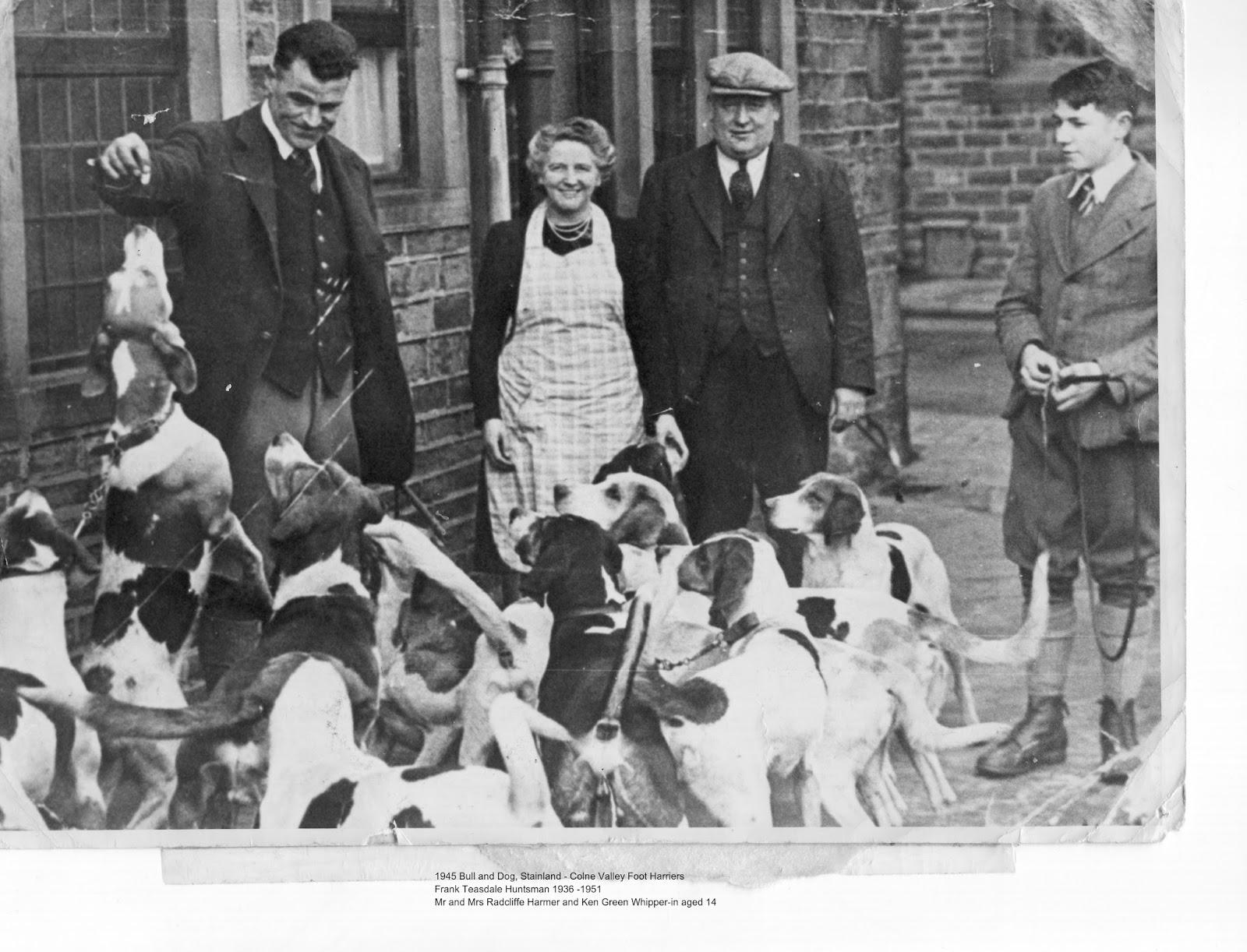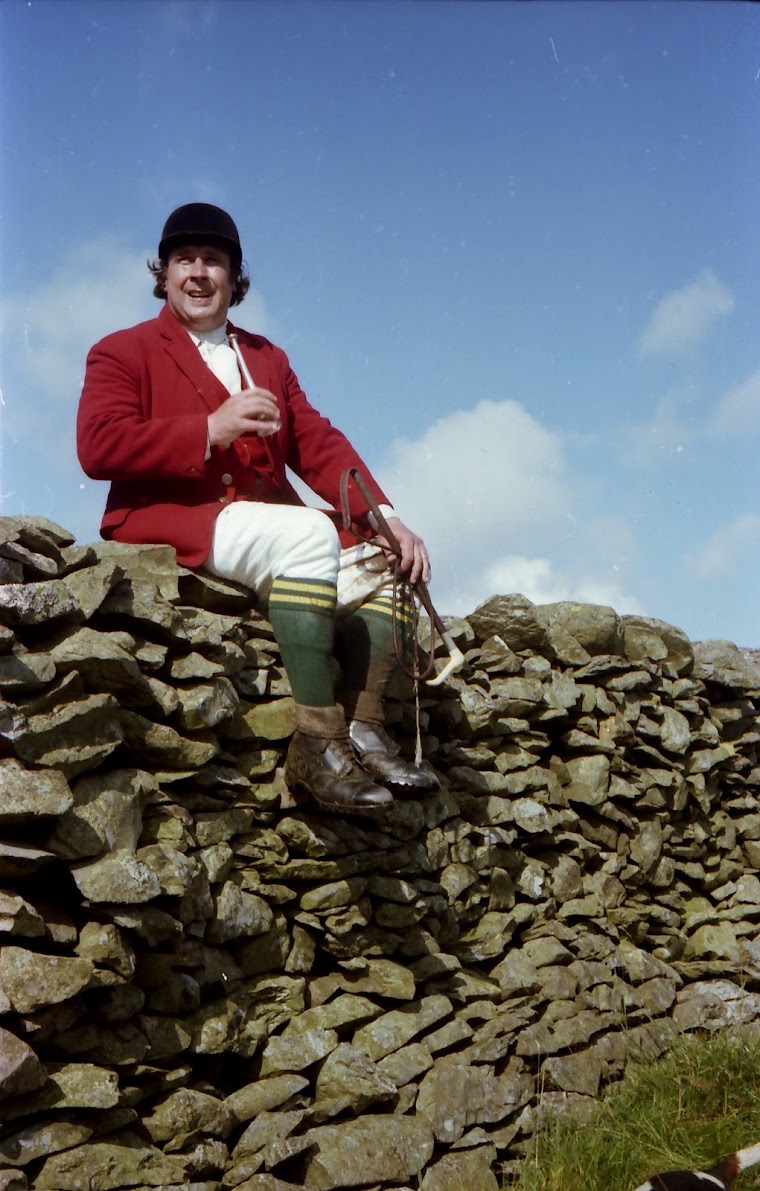THE COLNE VALLEY BEAGLES - LOOKING BACK
‘Scarlet and
Green’ is
a book, long out of print, written by
Ken Green and Simon Shaw, illustrating three centuries of the Colne Valley
Beagles.
Some of the illustrations below appear in the book
and some others I have culled from the late Ken Green’s extensive archives and are
probably courtesy of Huddersfield Examiner, as no one else took decent
photographs in the days they represent.
A few on here date from the earliest days when
the pack was kenneled at Black Rock Mills, Linthwaite and Henry Lockwood, nicknamed Peg Lockwood as he was thought to have a wooden leg, was the Master, the Lockwood family owning the mill.
In fact my first real job was as a textile designer there, by which time the
hounds were long gone from the mill and other generations of Lockwoods ran the factory
producing ‘Colne Valley Tweed’. The mill, now mostly demolished, was forever known locally as 'Peg Lockwood's'.
The pack was originally a harrier pack, not
beagles, and somehow it was held together during WW2 until the cost
and inconvenience of harriers forced the change to the more practical beagles in 1951.
Of the authors, Ken Green was a CVB huntsman for
21 years. His day job was as a self
employed window cleaner. I mention this because there are those who seem to
think ‘hunting’ is for ‘toffs’ but if you look at the photographs you will see
this is not necessarily the case. Both the CVB and the HVB are what one might call working class hunts, note the cloth caps, even if they were supported by the occasional local millowner. So called social and financial status were and still are a complete irrelevance to the membership and many of us still wear cloth caps which are part of the hunt uniform. The
CVB as with the Holme Valley Beagles used to have two meets on a Saturday, one
in the morning with a break at a pub for quick refreshment then an afternoon
meet so that the millworkers, the engineers, the chemical and other workers of the area could get
there after the obligatory Saturday morning work of that era. Simon Shaw was a close friend of Ken Green,
was a whipper-in and is custodian of much of Ken’s collection of CVB memorabilia
and shared his passion for documenting the history of the hunt.
The pack became known as the Colne Valley Foot Harriers in 1893
although the book says there are records dating back to 1690. Prior to 1893 Henry Lockwood had been associated with the Slaithwaite and Glocar Hunt for ten years. Their hounds lived in homesteads around the area and were called together on the day of hunting. He brought them together to form the Colne Valley Foot Harriers
The first image is that of Henry Lockwood, with the harriers and his huntsman Andy Dyson with the
old Southern hound type along with three pure bred otterhounds.
 |
| Henry Lockwood and Andy Dyson in 1893 |
 |
|
1907 Arthur Booth at the Royal Hotel with the
harriers.
|
 |
1911 Colne Valley Harriers with Huntsman Arthur
Booth. Henry Lockwood, Master, is third
from the right with his hunting horn in his vest.
|
 |
|
1923 Colne Valley Harriers with Huntsman Arthur
Booth at The Lamb Hotel, Hillhouse.
|
 |
|
Dave
O’Lindas, gamekeeper for the Whitley Beaumont estate who lived at
Dungeon Cottage which became the home of the Colne Valley hounds in 1915
|
 |
|
Dungeon
Cottage
|
 |
|
A
centenary plate
|
 |
|
A
bit of the history. An escaping Luddite
hid the guns somewhere in the wood here.
|
 |
| Colne Valley Harriers in 1938 with Frank Teasdale as huntsman |
 |
| A protest delegation by members of the Saddleworth Hunt and the CVB at Westminster in 1949 where a Bill to outlaw some forms of hunting was defeated by 214 votes to 101 |
 |
| At the bull and Dog, Stainland with Frank Teasdale, huntsman 1936 to 1951 and Ken Green, his young whipper-in age 14. Mr and Mrs Radcliffe Harmer are the publicans. |
Joe O’Lukes was a religious man who would not work
on a Sunday and was very involved with local hunts.. He was keeper of the Upperwood Estate at Greenfield but got sacked as he fell
asleep after a session in the Cross Keys at Uppermill and set fire to the moor
with his pipe. He is remembered for sitting
in the corner of The Junction, in Marsden, wearing a trilby and a long black coat
with a full set of hunt buttons on it. The coat held fame as he claimed it was the hunting
coat that gamekeeper William Uttley wore when he was murdered in 1903 on
Marsden Moor and still sported the shot holes from that event. Joe features in the song ‘The Keepers and the
Drivers’, and the unsolved Marsden Moor murder was set in verse called, ‘On a
wild September’s day’ by the well known local poet Ammon Wrigley. There are plaques on the high stone edge of Pots
and Pans commemorating Ammon. Joe died
in 1955 and instructed that his hunt buttons be cut off and distributed to his
favourite women in the village.
 |
| 1951 The last season of the harriers |
 |
| The first opening meet of the Colne Valley Beagles
at the Bull’s Head, Blackmoorfoot in September 1951 |
 |
|
1955
Boxing Day Meet at Wappy Springs. Alf O’Bonks
who is the fifth on the left in a flat cap, normally a bowler, was another real
character of the CVB and may get mentioned another time.
|
 |
|
1957
the CVB at the Rising Sun
|
 |
|
1962
Boxing Day in the snow at Wappy Springs
|
Just
to round off looking back from 1962, just over 50 years ago, a bit of a sequel.
 |
|
1972
Ken Green’s retirement presentation after 21 years service.
|






